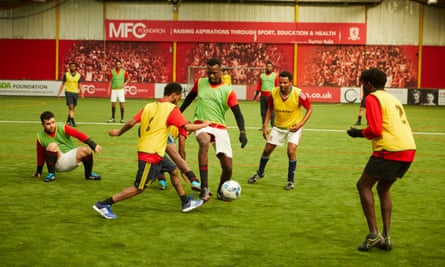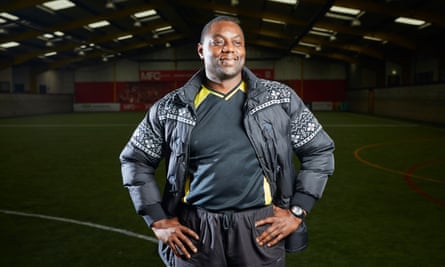Mutwakil Muhammad Ali beams, resplendent in Middlesbrough’s bright-red home kit. “They are giving me everything – shoes, clothes, support. I don’t know how to thank them for what they have done for me.”
A refugee who fled Sudan’s civil war in search of a better life, Mutwakil has been attending the weekly Club Together sessions at the Herlingshaw Centre in Middlesbrough’s South Bank since it began last year. Established by the Championship club’s MFC Foundation in conjunction with local charity the Methodist Asylum Project, the project brings together more than 30 refugees and asylum seekers to socialise, learn English and, more importantly, indulge in their true passion: football.
“This is my favourite session of the week. It’s been brilliant,” says Paul South from MFC Foundation. “The guys really enjoy it and are really grateful for the opportunity. Wearing the Boro kit gives them a sense of identity.”
In a city that became synonymous for the rising tensions between the UK’s existing population and the new arrivals in 2016, that is particularly important. The Home Office has only recently started sending asylum seekers to Middlesbrough again after they became a target for vandals after initially being housed in accommodation that made them easily identifiable by their red doors. An investigation last year found that more than five times as many destitute asylum seekers live in the poorest third of the country as in the richest third, with the strain felt most by local councils and charities.
The new influx to Middlesbrough since the end of last year has led to an increase in those wishing to attend the Club Together sessions, and South admits he has been forced to abandon English lessons for now. “We had a lot of new arrivals just before Christmas and the club donated 50 full kits,” he says. “Without being able to work, there’s not a lot of structure in the lives of the guys that come to our sessions – they go to the drop-in centre and that’s about it. So this is great for helping them to meet new people and integrate into society.”
For those with the ability who want to play more often, there is also the option of joining Justice FC. Its founder, John Yarro, decided to set up the Sunday league side in 2013 when he was walking home through his local park and noticed a group of young refugees hanging around selling drugs and fighting. “I thought to myself, ‘Why are they doing this?’. I went over and asked them, ‘would you be happy if I can bring a football and we play?’ And they all said, ‘Yeah, yeah, yeah.’ That’s how the team started.”

Now comprising nearly 20 nationalities across a men’s and women’s side, they have progressed to the top division of the highly competitive Stockton Sunday League and Yarro believes some of his players deserve an opportunity to prove themselves at a higher level. Their presence has not been universally welcomed, however. In one match this season, two players were sent off after a referee forbade them from speaking any other language than English, while Yarro, who is originally from Cameroon, claims his players are regularly abused by opponents.
“We have no funding and no support,” he says. “We have also faced a lot of discrimination on the pitch – in more than one game our players have been told to ‘go back to your own country’. It’s not just about football but about challenging that sort of behaviour in society. We’re proud of what we have achieved with all these challenges – hopefully one day we will produce a professional player.”
South adds: “John is more of a mentor than a football coach. If players are good enough then it’s important that we can give them a platform to play.”

Middlesbrough are among the first English clubs to have already set up their own project aimed at refugees, but these efforts pale in comparison with those being made in Germany. Last year the Guardian visited Borussia Dortmund’s Welcome to Football initiative, which is of one of 65 sessions involving around 800 refugees taking place on a weekly basis across the country.
After the success of last year’s inaugural event, the second edition of Amnesty’s Football Welcomes project will take place at the end of April and organiser Naomi Westland is hoping that can help to create a similar network of support.
“I’m talking to a few clubs about what is happening in Germany to see if we can replicate it here,” she says. “There’s loads of interest and we have a couple of clubs already speaking to local charities about how they can work together. Middlesbrough is very similar to what is happening in Germany but on a much smaller scale. It has grown organically, which shows that even though the structures of German football are different to here, it can still work.”
